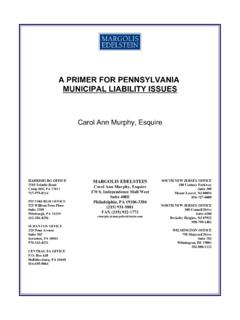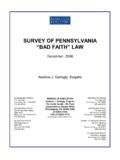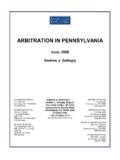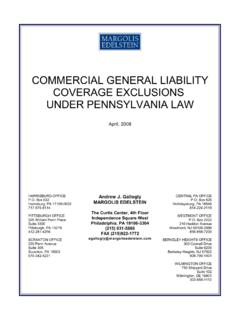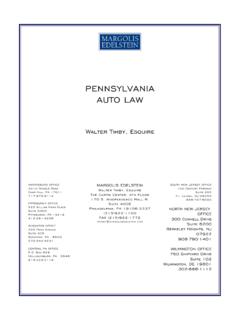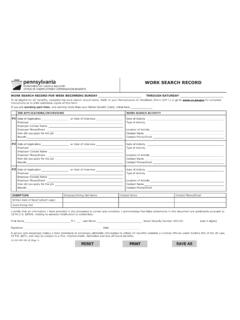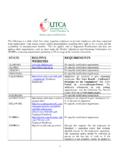Transcription of EMPLOYMENT LAW MANUAL - Margolis Edelstein
1 EMPLOYMENT LAW MANUAL Prepared By: The EMPLOYMENT Group of Margolis Edelstein By: Walter J. Timby, III, Esquire Harrisburg Office Margolis Edelstein Westmont Office Box 932 The Curtis Center, 4th Floor P. O. Box 2222 Harrisburg, PA 17106-0932 Independence Square West 216 Haddon Avenue 717-975-8114 Philadelphia, PA 19106-3304 Westmont, NJ 08108-2886 (215) 922-1100 856-858-7200 Pittsburgh Office Fax (215) 922-1772 310 Grant Street Berkeley Heights Office The Grant Building Walter J.
2 Timby, III, Esquire Three Connell Drive Suite 1500 Suite 6200 Pittsburgh, PA 15219-2203 Berkeley Heights, NJ 07922 412-281-4256 Christopher A. Tinari, Esquire 908-790-1401 Scranton Office Delaware Office The Oppenheim Building William E. Remphrey, Jr., Esquire 1509 Gilpin Avenue 409 Lackawanna Avenue Wilmington, DE 19806 Suite 3C 302-777-4680 Scranton, PA 18503 570-342-4231 Common Law Principles I. AT-WILL EMPLOYMENT - PENNSYLVANIA A. General Rule The Commonwealth of Pennsylvania follows as does most of the United States, the prevailing status of EMPLOYMENT is considered to be at-will.
3 Paul v. Lankenau Hospital, 524 Pa. 90, 569 346 (1990); Clay v. Advanced Computer Applications, Inc., 522 Pa. 86 559 917 (1989); Geary v. United States Steel Corp., 456 Pa. 171, 319 174 (1974). The EMPLOYMENT at-will doctrine provides that, absent contractual or statutory restriction, either the employer or the employee may terminate the EMPLOYMENT relationship for any reason or for no reason at all. McLaughlin v. Gastrointestinal Specialists, Inc., 696 173 (Pa. Super. 1997); Pipkin v. Pennsylvania State Police, 548 Pa.
4 1, 693 190 (1997). The general rule is that no cause of action exists for terminating an at-will EMPLOYMENT relationship. Stumpp v. Stroudsburg Municipal Authority, 540 Pa. 391, 396, 658 333, 335 (1995). Contracts of EMPLOYMENT 1. Express Contracts If an employee has an express EMPLOYMENT agreement for a term certain, the employee is no longer at will and may only be discharged pursuant to the terms of the contract. EMPLOYMENT is presumptively at will unless an employee can provide clear proof that an express contract exists for a specific term or duration of EMPLOYMENT or that the contract provides for discharge only for just cause or other specified reasons.
5 Holewinski v. Children s Host of Pittsburgh, 437 Pa. Super. 174, 649 712 (1994), allocatur support denied, 540 Pa. 641, 659 560 (1995). Although certain contract terms may be applied, the existence of the EMPLOYMENT contract itself cannot be implied, and must be proven with evidence of a specific term of EMPLOYMENT or cause for termination. Rodgers v. Prudential Ins. Co. of America, 803 F. Supp. 1024 ( Pa. 1992), Aff d, 998 1004 (3d Cir. 1993). Pennsylvania presumes all EMPLOYMENT to be at will. See Geary v. United States Steel Corp.
6 , 456 Pa. 171, 319 174 (1974). The party attempting to overcome the presumption must show clear and precise evidence of an oral EMPLOYMENT contract for a definite term. See Gorwara v. AEL Indus., Inc., 784 F. Supp. 329, 242 ( Pa. 1992). Salary computed to a specific time period is insufficient to establish a contract. Booth v. McDonnell Douglas Truck Servs. Inc., 401 Pa. Super. 234, 585 24 (1990), allocatur denied, 528 Pa. 620, 597 1150 (1991). An employee is not guaranteed a term of EMPLOYMENT as a result of a promise to maintain EMPLOYMENT if performance is good.
7 See McWilliams v. AT&T Info Sys Inc., 728 F. Supp. 1186 ( Pa. 1990). 2. Employee Handbooks Plaintiffs have successfully pursued causes of action based upon the provisions set forth in a handbook , MANUAL or policies written and provided by the employer. Pennsylvania Courts have held, however, that a handbook only has legally binding contractual significance if the handbook or oral modification to the handbook clearly states that it is to have this effect, Anderson v. Haverford College, 851 179, 182 ( Pa.)
8 1994); Martin v. Capital Cities Media, Inc., 354 Pa. Super. 199, 511 830 (1986), Allocatur Denied, 514 Pa. 643, 523 1132 (1987), or if it clearly states that an employee may be discharged only for just cause. Reilly v. Stroehmann Brothers Co., 532 1212, 1216 (1987). The mere publishing of a handbook does not create the meeting of the minds required to create a contract unless the parties bargained for the handbook provisions. Martin, supra. Similarly, where the employer reserves the right in a handbook or policy MANUAL to make unilateral changes, and provides a nonexclusive list of offenses which constitute cause for discharge, a plaintiff cannot reasonably expect that the employer intends to bind itself to that handbook or policy.
9 Luteran v. Loral Fairchild Corp., 455 Pa. 364, 688 211, Allocatur Denied, 701 578 (Pa. 1997). To overcome the at-will presumption, there must be an express contract between the parties, or an implied-in-fact contract plus consideration passing from the employee to the employer from which the court can infer the parties intended to overcome the at-will presumption. Sharp v. BW/IP Int l, Inc. 991 F. Supp. 451, 459 ( Pa. 1998) (citing Anderson v. Haverford College, 851 F. Supp. 179, 181 ( Pa. 1994)). Pennsylvania courts agree that an appropriate disclaimer in the employee handbook with regard to the at-will status of the employee is sufficient to overcome an employee s argument that the handbook creates a contract for EMPLOYMENT .
10 Thus, an employer may issue statements in an employee handbook that are not contractually binding, so long as such statements are accompanied with an appropriate, conspicuous disclaimer. Morten v. Cities Media, Inc., 354 Pa. Super. 119, 511 830 (1986), allocatur denied, 514 Pa. 643, 523 1132 (1987). 3. Additional Consideration Supplied by Employee The presumption of at-will EMPLOYMENT may be overcome by showing that the employee provided substantial additional consideration to the employer and termination of EMPLOYMENT would result in great hardship or loss to the party known to be both employer and employee when the contract was made.
